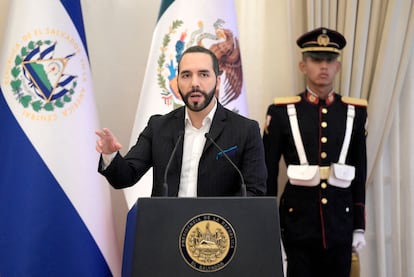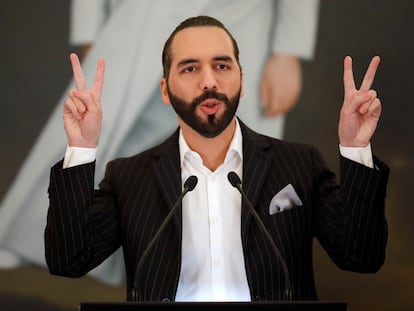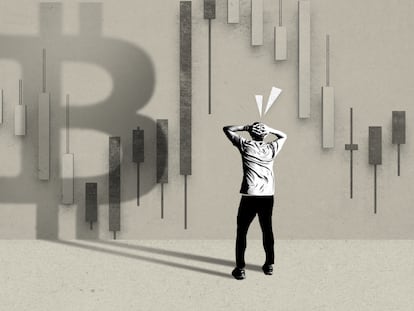El Salvador expected to default as bitcoin plummets
The Central American country made the cryptocurrency legal tender last year, but since then, it has continued to fall, raising concerns about whether it will be able to meet its next debt payment


The Salvadoran experiment to make bitcoin legal currency has hit a wall. As a result of the fall in global markets caused by the uncertainty of the war in Ukraine, rising inflation and the US Federal Reserve’s decision to raise interest rates, the price of the most popular cryptocurrency in the world has plummeted more than 50% from its all-time highs. And with it, so too have the bonds of the government of El Salvador, which are trading at 40% of their original value, as investors start to doubt whether the country can meet its next debt payment.
Last September, Salvadoran President Nayib Bukele announced that El Salvador would become the first country in the world to accept bitcoin as legal tender, alongside the US dollar. Ratings agencies warned that the volatility of the cryptocurrency would impact the country’s already fragile public finances. But this did not deter Bukele. In October, he announced that the government had purchased nearly $25 million worth of bitcoin. The following month, Fitch Ratings, an American credit rating agency, warned in a report: “Widespread adoption of bitcoin has been limited by its inherent price volatility, the domestic banking sector’s low financial inclusion and the lack of broad internet availability.”
Despite its low adoption among the population, the decision to make bitcoin legal tender had an immediate impact on the Central American country. The International Monetary Fund (IMF), which could provide financing to help the Bukele government to meet its next foreign debt payment in January 2023, urged the country to remove bitcoin as legal currency as this exposes the state coffers to the price volatility of the cryptocurrency. Bukele’s insistence on keeping it as legal tender complicated his negotiations with the IMF.
The ups and downs of the market, coupled with the weakening of institutions in El Salvador, led several credit agencies to downgrade the country’s rating, which is largely used by the market to assess the likelihood of debt default. A low rating means that the government has to pay creditors higher interest rates as it is considered higher risk. While a credit rating of CCC, described as “junk” in the industry, prevents a country from accessing global markets to issue more debt. In February, Fitch downgraded El Salvador’s rating to this level, while the credit agency Moody’s made the same decision in May.
In a statement, Fitch explained: “The downgrade reflects heightened financing risks stemming from increased reliance on short-term debt, a $800 million Eurobond repayment due in January 2023, a still-high fiscal deficit, limited scope for additional local market financing, uncertain access to additional multilateral funding and external market financing given high borrowing costs.”
The firm added that debt to gross domestic product (GDP) is expected to rise to 86.9% in 2022, “increasing concerns around debt sustainability over the medium term.”
“In Fitch’s view, weakening of institutions and concentration of power in the presidency have increased policy unpredictability, and the adoption of bitcoin as legal tender has added uncertainty about the potential for an IMF program that would unlock financing for 2022-2023,” the report stated.
For its part, Moody’s warned in May that “even if the government finds a way to manage near-term financing pressures from the upcoming 2023 bond maturity, Moody’s view is that the sovereign will continue to face funding pressures that would compromise its ability to service its debt commitments in full.”
Tu suscripción se está usando en otro dispositivo
¿Quieres añadir otro usuario a tu suscripción?
Si continúas leyendo en este dispositivo, no se podrá leer en el otro.
FlechaTu suscripción se está usando en otro dispositivo y solo puedes acceder a EL PAÍS desde un dispositivo a la vez.
Si quieres compartir tu cuenta, cambia tu suscripción a la modalidad Premium, así podrás añadir otro usuario. Cada uno accederá con su propia cuenta de email, lo que os permitirá personalizar vuestra experiencia en EL PAÍS.
En el caso de no saber quién está usando tu cuenta, te recomendamos cambiar tu contraseña aquí.
Si decides continuar compartiendo tu cuenta, este mensaje se mostrará en tu dispositivo y en el de la otra persona que está usando tu cuenta de forma indefinida, afectando a tu experiencia de lectura. Puedes consultar aquí los términos y condiciones de la suscripción digital.










































